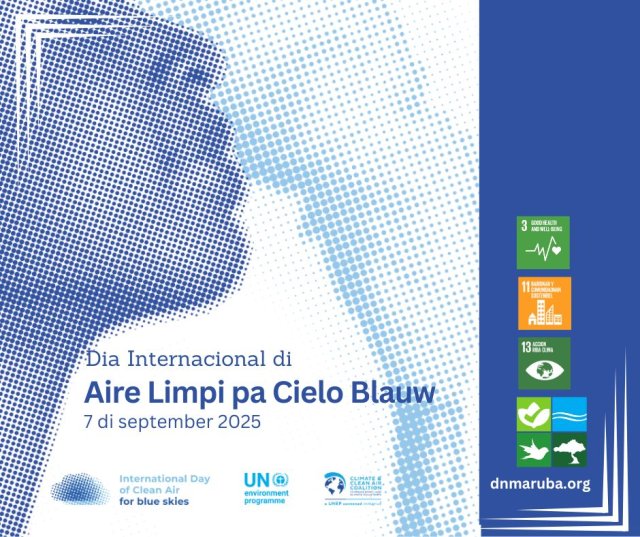International Clean Air for Blue Skies Day: Sixth Observance by the United Nations
ORANJESTAD – Celebrated under the theme “Racing for Air”, the sixth International Day of Clean Air for Blue Skies highlights the urgent need to accelerate solutions for clean air through collective action.
This year’s campaign connects clean air with themes of sport, performance, and endurance. The word battle refers to the strong competition—a race—for cleaner air. Air pollution is the second leading risk factor for global death, causing an estimated 8.1 million premature deaths each year from diseases such as stroke, heart disease, lung cancer, and acute respiratory infections.
The United Nations General Assembly designated September 7 as International Day of Clean Air for Blue Skies in 2019, emphasizing the importance of raising awareness at all levels and promoting actions to improve air quality. In Aruba, the Department of Nature and Environment (Directie Natuur en Milieu - DNM) supports this awareness campaign, reminding us that while we enjoy clear blue skies almost daily, harmful pollutants may still be present in the air we breathe.
Key Facts About Air Quality
As shared by the United Nations:
- Our very first contact with the world at birth is air. We inhale about 12 times per minute.
- Air sustains life, but it can also take life.
- 99% of the world’s population breathes polluted air.
- Air pollution is the greatest environmental health risk of our time.
- It accelerates climate change, causes economic losses, and reduces agricultural productivity.
- Air pollution has no borders, which makes protecting the atmosphere a shared responsibility.
Through collaboration, investment, and collective effort, we can reduce pollution and secure clean air for all. On this observance, the UN calls on everyone to join the race—to proactively fight air pollution and work toward healthier skies.
The Impact of Air Pollution
Air pollution comes from many sources, including the burning of fossil fuels and biomass, releasing gases that warm our planet. Like climate change, air pollution affects everyone—but especially pregnant people, babies, children, the elderly, people in poverty, and historically marginalized communities.
The numbers reveal the scale of the challenge:
- 99% of the world’s population breathes polluted air.
- In 2021, air pollution caused 8.1 million deaths, over 90% linked to non-communicable diseases.
- More than 700,000 children under five died due to air pollution.
- By 2050, air pollution could destroy half of the world’s crops.
- The global economy loses an estimated $8.1 trillion annually (6.1% of world GDP) from air pollution-related healthcare costs and reduced productivity.
A Call to Action
The 2030 Agenda for Sustainable Development (SDGs) urges the reduction of air pollution as a critical step toward achieving its goals. Ensuring a clean, healthy, and sustainable environment is essential for human rights, well-being, and future generations.

